
The recorded history of Scotland begins with the arrival of the Roman Empire in the 1st century, when the province of Britannia reached as far north as the Antonine Wall. North of this was Caledonia, inhabited by the Picti, whose uprisings forced Rome's legions back to Hadrian's Wall. As Rome finally withdrew from Britain, Gaelic raiders called the Scoti began colonising Western Scotland and Wales. Prior to Roman times, prehistoric Scotland entered the Neolithic Era about 4000 BC, the Bronze Age about 2000 BC, and the Iron Age around 700 BC.
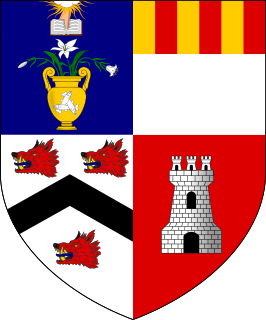
The University of Aberdeen is a public research university in Aberdeen, Scotland. It is an ancient university founded in 1495 when William Elphinstone, Bishop of Aberdeen and Chancellor of Scotland, petitioned Pope Alexander VI on behalf of James IV, King of Scots to establish King's College, making it Scotland's third-oldest university and the fifth-oldest in the English-speaking world. Aberdeen is consistently ranked among the top 160 universities in the world and is ranked within the top 20 universities in the United Kingdom according to The Guardian, The Times and The Sunday Times.

John of Lancaster, 1st Duke of Bedford KG was a medieval English prince, general and statesman who commanded England's armies in France during a critical phase of the Hundred Years' War. Bedford was the third son of King Henry IV of England, brother to Henry V, and acted as regent of France for his nephew Henry VI. Despite his military and administrative talent, the situation in France had severely deteriorated by the time of his death.
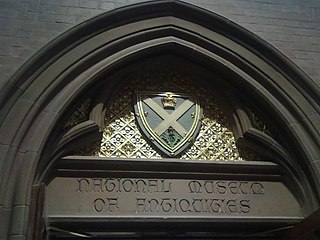
The Society of Antiquaries of Scotland is the senior antiquarian body of Scotland, with its headquarters in the National Museum of Scotland, Chambers Street, Edinburgh. The Society's aim is to promote the cultural heritage of Scotland.
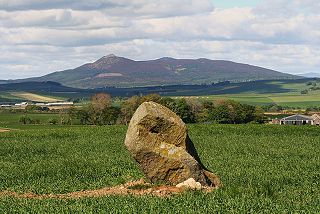
The Battle of Harlaw was a Scottish clan battle fought on 24 July 1411 just north of Inverurie in Aberdeenshire. It was one of a series of battles fought during the Middle Ages between the barons of northeast Scotland against those from the west coast.
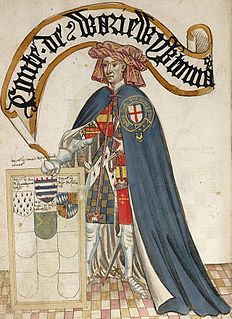
Thomas de Beauchamp, 11th Earl of Warwick, KG, sometimes styled as Lord Warwick, was an English nobleman and military commander during the Hundred Years' War. His reputation as a military leader was so formidable that he was nicknamed 'the devil Warwick' by the French. In 1348 he became one of the founders and the third Knight of the Order of the Garter.

The Parliament of Scotland was the legislature of the Kingdom of Scotland. The parliament, like other such institutions, evolved during the Middle Ages from the king's council of bishops and earls. It is first identifiable as a parliament in 1235, during the reign of Alexander II, when it was described as a "colloquium" and already possessed a political and judicial role. By the early 14th century, the attendance of knights and freeholders had become important, and from 1326 commissioners from the burghs attended. Consisting of the "three estates" of clergy, nobility and the burghs sitting in a single chamber, the parliament gave consent for the raising of taxation and played an important role in the administration of justice, foreign policy, war, and all manner of other legislation. Parliamentary business was also carried out by "sister" institutions, such as General Councils or Convention of Estates. These could carry out much business also dealt with by parliament – taxation, legislation and policy-making – but lacked the ultimate authority of a full parliament.

Scotland in the Middle Ages concerns the history of Scotland from the departure of the Romans to the adoption of major aspects of the Renaissance in the early sixteenth century.
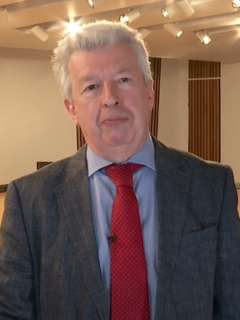
Roderick Lewis Macdonald is a Scottish politician who was a Member of the Scottish Parliament (MSP) for the North East Scotland region between 2011 and 2021. A member of Scottish Labour, he previously represented the Aberdeen Central constituency from 1999 to 2011. He was a deputy Scottish Executive minister from 2001 to 2007.
Gerald Leslie Harriss FBA was an English historian of the Late Middle Ages. His work focused on the parliamentary, financial and administrative history of the period. Harriss was a Fellow of Magdalen College, Oxford.

Henry de Lichton [de Lychtone, Leighton] was a medieval Scottish prelate and diplomat, who, serving as Bishop of Moray (1414–1422) and Bishop of Aberdeen (1422–1440), became a significant patron of the church, a cathedral builder, and a writer. He also served King James I of Scotland as a diplomat in England, France, and Italy.
David Ditchburn is a Scottish historian. He is a senior lecturer at Trinity College Dublin.

Prof Hector Munro Macdonald FRAS FRSE LLD was a Scottish mathematician, born in Edinburgh in 1865. He researched pure mathematics at Cambridge University after graduating from Aberdeen University with an honours degree.
Walter de Coventre was a 14th-century Scottish ecclesiastic. There is no direct evidence of his birthdate, his family, or his family's origin, although he may have come from the region around Abernethy, where a family with the name de Coventre is known to have lived. Walter appeared in the records for the first time in the 1330s, as a student at the University of Paris. From there he went on to the University of Orléans, initially as a student before becoming a lecturer there. He studied the arts, civil law and canon law, and was awarded many university degrees, including two doctorates. His studies were paid for, at least partially, by his benefices in Scotland. Despite holding perhaps more than five benefices at one stage, he did not return to Scotland until the late 1350s.

The Kingdom of Scotland was a sovereign state in northwest Europe traditionally said to have been founded in 843. Its territories expanded and shrank, but it came to occupy the northern third of the island of Great Britain, sharing a land border to the south with the Kingdom of England. It suffered many invasions by the English, but under Robert the Bruce it fought a successful War of Independence and remained an independent state throughout the late Middle Ages. Following the annexation of the Hebrides and the Northern Isles from the Kingdom of Norway in 1266 and 1472 respectively, and the final capture of the Royal Burgh of Berwick by the Kingdom of England in 1482, the territory of the Kingdom of Scotland corresponded to that of modern-day Scotland, bounded by the North Sea to the east, the Atlantic Ocean to the north and west, and the North Channel and Irish Sea to the southwest. In 1603, James VI of Scotland became King of England, joining Scotland with England in a personal union. In 1707, the two kingdoms were united to form the Kingdom of Great Britain under the terms of the Acts of Union.

Scotland in the Late Middle Ages, between the deaths of Alexander III in 1286 and James IV in 1513, established its independence from England under figures including William Wallace in the late 13th century and Robert Bruce in the 14th century. In the 15th century under the Stewart Dynasty, despite a turbulent political history, the Crown gained greater political control at the expense of independent lords and regained most of its lost territory to approximately the modern borders of the country. However, the Auld Alliance with France led to the heavy defeat of a Scottish army at the Battle of Flodden in 1513 and the death of the king James IV, which would be followed by a long minority and a period of political instability.
Rhind Lectures are a series of lectures on archaeological topics. They have been hosted by the Society of Antiquaries of Scotland since 1874. The content of the lectures is usually published in journals or expanded into new works by their authors.

Scottish society in the Middle Ages is the social organisation of what is now Scotland between the departure of the Romans from Britain in the fifth century and the establishment of the Renaissance in the early sixteenth century. Social structure is obscure in the early part of the period, for which there are few documentary sources. Kinship groups probably provided the primary system of organisation and society was probably divided between a small aristocracy, whose rationale was based around warfare, a wider group of freemen, who had the right to bear arms and were represented in law codes, above a relatively large body of slaves, who may have lived beside and become clients of their owners.

The Renaissance in Scotland was a cultural, intellectual and artistic movement in Scotland, from the late fifteenth century to the beginning of the seventeenth century. It is associated with the pan-European Renaissance that is usually regarded as beginning in Italy in the late fourteenth century and reaching northern Europe as a Northern Renaissance in the fifteenth century. It involved an attempt to revive the principles of the classical era, including humanism, a spirit of scholarly enquiry, scepticism, and concepts of balance and proportion. Since the twentieth century, the uniqueness and unity of the Renaissance has been challenged by historians, but significant changes in Scotland can be seen to have taken place in education, intellectual life, literature, art, architecture, music, science and politics.
George David Smith Henderson is a British art historian, author, and Emeritus Professor of Medieval Art at the University of Cambridge. He is a Fellow of The Society of Antiquaries of London and a member of the Association of Art Historians. He was awarded the Reginald Taylor Prize by the British Archaeological Association in 1962 for his paper "The Sources of the Genesis Cycle at St.-Savin-sur-Gartempe".












